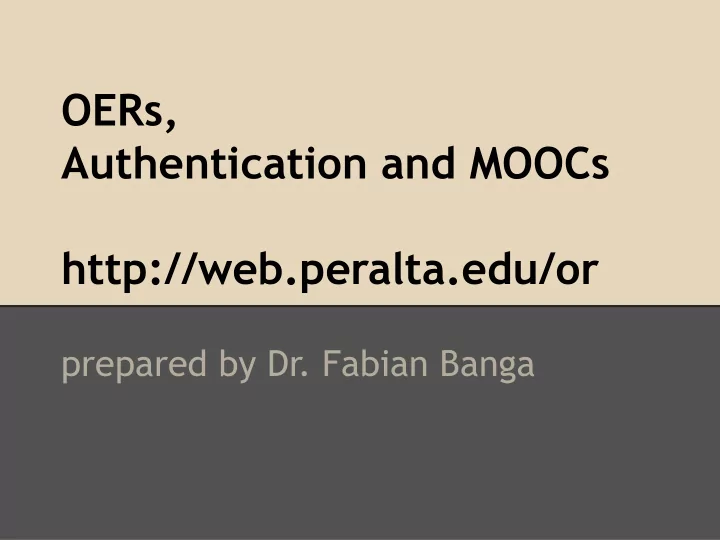

OERs, Authentication and MOOCs http://web.peralta.edu/or prepared by Dr. Fabian Banga
Authentication Authentication is the process of determining whether someone or something is, in fact, who or what it is declared to be. Student authenticity is the implementation of activities and assessment strategies, which require the learner to apply the knowledge learned by using higher order thinking skills. Examining the Effectiveness of Student Authentication and Authenticity in Online Learning at Community Colleges - Dissertation by Mitra Hoshiar
Interaction “Furthermore, students are authenticated through sufficient interaction between students and instructors to further contribute to verifying a student’s identity. Instructors will also determine the situations when a proctored examination will be required.”
OER Open Educational Resources
Opening Up Education, by Toru Iiyoshi and M. S. Vijay Kumar / The MIT Press “Today, a confluence of events is creating the perfect storm for significantly advancing education. With a growing inventory of openly available educational tools and resources, and with an increasingly engaged and connected community, transformative opportunities for education abound. We see a proliferation of new initiatives, many with the potential to radically change the ecology and the economics of education. However, to date, many innovative educational endeavors still remain in isolated and closed domains, rarely shared across classrooms, disciplines, or institutions. Thus, educators find it difficult to advance their pedagogical practice and knowledge as a community.”
What is Open Source and the Open Source Initiative? Generically, open source refers to a program in which the source code is available to the general public for use and/or modification from its original design free of charge, i.e., open. Open source code is typically created as a collaborative effort in which programmers improve upon the code and share the changes within the community. Open source sprouted in the technological community as a response to proprietary software owned by corporations / from: http://www.webopedia.com/TERM/O/open_source.html More here: http://www.opensource.org/about
what is MOOC? A massive open online course (MOOC) where the participants are distributed and course materials also are dispersed across the web. As of August 2012, MOOCs are a very recent variant of online education, which itself is a form of distance education. http://www.youtube.com/watch?v=eW3gMGqcZQc (presentation)
xMOOCs and cMOOCs George Siemens and Stephen Downes, helped pioneer these courses in Canada. Siemens and Downes have done much of the work, theoretical and practical, distinguishing between good and bad MOOC’s. However all of the press coverage has gone to the competing Stanford edu-preneurs behind Coursera and Udacity, and edX http://chronicle.com/blogs/brainstorm/good-moocs-bad -moocs/50361
Well-known MOOC sites xMOOCs: http://edx.org http://coursera.org http://udacity.com cMOOCs: CFHE12: http://edfuture.net/ our MOOC...
"MOOCs are really a platform" by George Siemens Our MOOC model emphasizes creation, creativity, autonomy, and social networked learning. The Coursera model emphasizes a more traditional learning approach through video presentations and short quizzes and testing. Put another way, cMOOCs focus on knowledge creation and generation whereas xMOOCs focus on knowledge duplication. I’ve spoken with learners from different parts of the world who find xMOOCs extremely beneficial as they don’t have access to learning materials of that quality at their institutions. xMOOCs scale, they have prestigious universities supporting them, and they are well-funded. It is quite possible that they will address the “drill and grill” instructional methods that is receiving some criticism. (25/07/2012)
Good MOOCs "Good MOOC’s [...] foreground and sustain the social dimension of learning and active practices, i.e., knowledge production rather than knowledge consumption. To a limited extent, certain experiments in MOOCs that foreground social media participation over “content mastery” realize some of the ideals of Siemen and Downes."
Recommend
More recommend